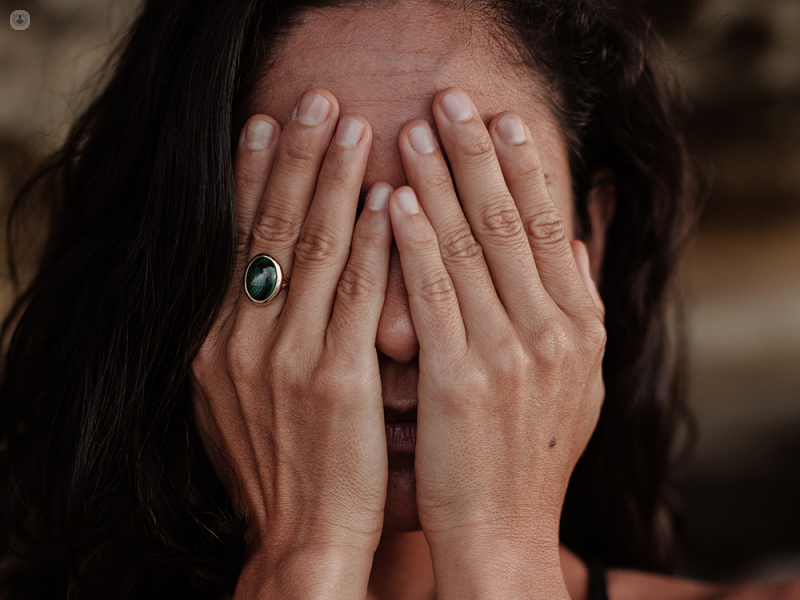How to overcome your phobia
Escrito por:While some people can live their lives successfully dodging their phobias, others have specific phobias of everyday things which they simply can't avoid. This can generate repeated or constant distress and disturbance to their quality of life.
So we spoke to Dr Lars Davidsson, one of our top consultant psychiatrists from the Anglo European Clinic to understand more about phobias and the treatments available to help people overcome them.

What is the difference between a fear and a phobia?
Fear is a psychological or emotional response to a real or perceived threat. For example, you might have a fear of heights, closed spaces, dogs, snakes, etc. in the sense that you don't like it and you feel uncomfortable when you confront it.
A phobia is very similar, but there is one main difference - the anxiety and distress you experience when confronting the thing you fear is much stronger and it interferes with your ability to function normally. It can even prevent you from engaging with it completely. Oftentimes, people with a real phobia to something will make an unusually large effort to avoid it.
For example, a person may have a fear of flying and although they don’t enjoy it, they may nevertheless be able to board a plane and fly. But, if a person has a phobia of flying, they will usually experience so much anxiety thinking about it that the worry will interfere with their day-to-day life and can even prevent them from boarding the plane completely.
If you have a fear or phobia of flying, many airline companies now offer courses to help people overcome it. For example, British Airways and EasyJet both have their own courses which include technical and psychology sessions followed by a flight.
It is important to make a distinction between fear and phobia to be able to offer the right treatment. However, this distinction can be a grey area; whether it is defined as a fear or phobia is ultimately decided by the patient and it is typically determined by how much discomfort the patient is willing to accept.
What are common phobias?
In theory, a person can develop a phobia to anything. However, some of the most common phobias include:
- Social phobias — fear of certain social situations
- Agoraphobia — fear of open spaces
- Acrophobia — fear of heights
- Pteromerhanophoba — fear of flying
- Claustrophobia — fear of small, enclosed spaces
- Ophidiophobia — fear of snakes
- Cynophobia — fear of dogs
- Entomophobia — fear of insects
- Trypanophobia — fear of needles
How do phobias develop?
Phobias can develop anytime throughout childhood, adolescence or adulthood. It’s not always clear how or why people develop specific phobias. Possible causes may include:
- Negative or traumatic experiences - phobias can develop as a result of having a traumatic experience related to a specific event, situation or object.
- Genetics - there is some evidence to suggest that phobias can be passed down through family members.
- Environment - phobias can become learned behaviour over time, especially if, as a child, you witnessed your parents or carers behaving negatively or fearful towards certain things.
- Brain function - chemical changes in the brain may play a role in the development of phobias.
How can a psychiatrist help a person overcome their phobia?
The first step in treating a phobia is to diagnose it by asking the patient how they believe it developed, what kind of symptoms they experience and how it is affecting their life.
Some people can live with their phobias while others have a phobia of everyday things that they simply can’t avoid, such as going into a lift, passing a dog on the street, getting on public transport, etc.
Exposure therapy is usually the most successful treatment. It consists of gently exposing the patient to the source of their anxiety or distress, and in doing so, will help them manage or overcome it. The idea is to slowly face your phobia. It requires a certain level of commitment from the patient by taking small but powerful steps to overcome their phobia.
A patient normally has their own fear threshold, however, once they learn to pass this threshold (with a psychiatrist's support) they often realise that they can be around their phobia. The more often the patient pushes pass their threshold, the less anxiety they experience.
Medication can be used in conjunction with therapy, which will reduce the patient's symptoms. However, medication doesn’t treat the phobia; it simple reduces their anxiety but their fear is still there.
When is a phobia considered to be cured?
Almost all phobias can be successfully treated but they aren’t always completely ‘cured’. What treatment does is reduces the discomfort and anxiety the patient experiences and makes it much more manageable, thus improving the patient’s quality of life.
If you have a phobia and would like to explore ways to treat it, visit Dr Lars Davidsson’s Top Doctors profile and book an appointment to see him.


